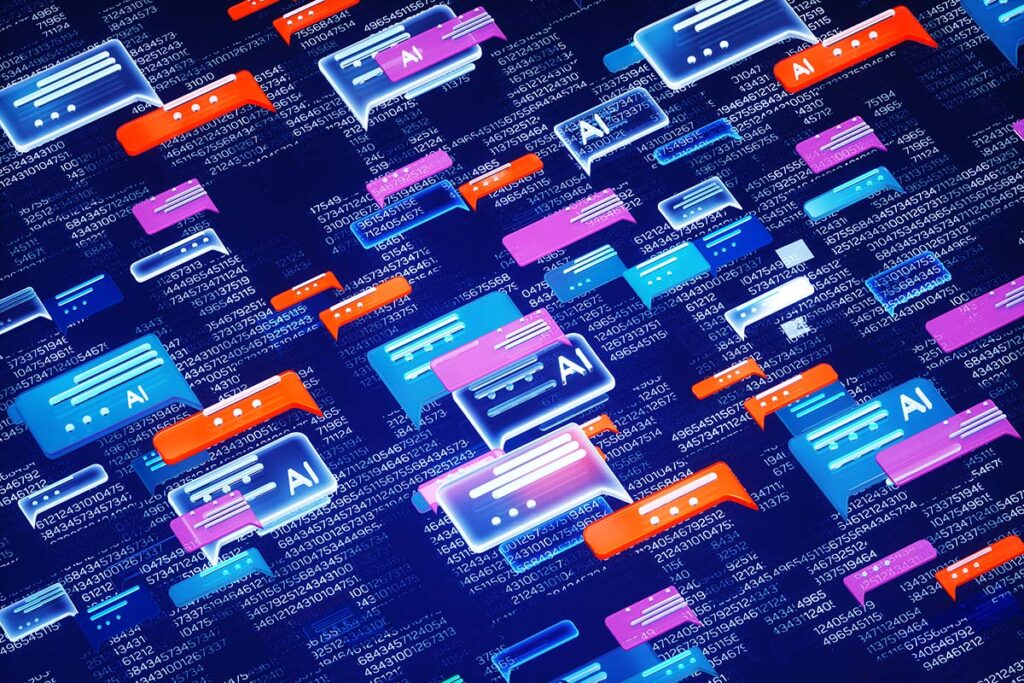You’re probably aware that AI (artificial intelligence) has come on in a big way. It’s being discussed in the media at great lengths and you may have even encountered it at work.
AI holds terrific promise for transforming many parts of our lives, including healthcare. But you’ve also probably read or heard that many people have concerns about AI. You may even be one of them.
So let’s take a look at some of the questions surrounding AI in healthcare.
What Is AI?
Artificial intelligence (AI) refers to complex computer systems that can carry out tasks once thought only humans were capable of. Chief among these is understanding everyday language and answering questions in that same human-like way.
AI can also produce images and sounds, carry out computer coding, and plan shopping lists. It’s almost endless.
AI in Healthcare
In healthcare, AI can do amazing things in many areas.
It can help providers take notes during clinic visits. Healthcare requires a lot of documentation to ensure patients are getting the right care at the right time, and AI is playing a growing role. AI “scribes” can convert conversations between patients and doctors into notes.
This frees up providers to focus their attention on the patient without having to type out everything they say. It also saves time. UVA Health providers recently started using AI this way.
It can also help doctors review a patient’s symptoms and suggest possible diagnoses and treatments, all for the doctor to evaluate. It can find abnormalities, such as hard-to-spot tumors, in X-rays, MRIs, CT scans, and mammograms.
In the lab, AI can identify cancer cells in patient slides. It helps pinpoint and interpret genetic mutations, making it easier to identify patients at risk for serious medical conditions.
In the operating room, surgeons use AI-assisted robotic tools to carry out complicated procedures. AI can also offer real-time feedback, letting surgeons know how things are going while they are working.
It can help identify hospital patients at risk for complications such as heart attack, sepsis, and readmission, allowing the care team to take preventive action.
AI in Medical Research & Education
AI helps scientists discover new drugs by simulating countless possible drug configurations and seeing how they might address specific problems. It can also predict which existing medications could be applied in new situations.
AI is helping investigators in clinical trials by going through enormous amounts of patient records to single out those who might be good study participants.
It’s also addressing information overload. There is a huge and ever-growing body of medical literature, making it almost impossible for physicians to keep up. AI can help by combing through these mountains of material and summarizing key findings. This helps doctors, and nurses, pharmacists, and others as well, to stay current in their fields.
Finally, AI is placing a growing role in medical education, creating realistic 3D environments and powering human-like mannequins in a number of medical and nursing schools, allowing students to learn while keeping patients out of harm’s way.
Possible Concerns With AI in Healthcare
Despite these contributions, patients and their families very reasonably have questions about the use of AI in healthcare. Here are some common questions and answers.
Is AI always right?
No. As you may know from the media, AI can make mistakes, just like people. Sometimes it makes things up entirely, which experts call “hallucinations.” These mistakes are declining as AI developers continue working hard to reduce errors — but human oversight remains essential.
Here’s a critical point: No healthcare professional, team, or hospital will use AI as the only reason for making healthcare decisions. Instead, they use it as a support tool, which they review and evaluate as part of their overall responsibilities to deliver the best care possible.
Will AI replace doctors and nurses?
No. While AI can help with many tasks, it can’t replace the observational powers, judgment, compassion, and experience that human doctors and nurses bring. Caring is a human activity based on people-to-people interactions. It can be aided by AI — not replaced by AI.
What about privacy?
Many people have this question; it’s a genuine issue in more and more aspects of our lives. From banking to shopping online, and now healthcare too, there will always be a chance that an unauthorized person will gain access to someone’s private data.
Just as with banks, for example, healthcare systems devote enormous amounts of resources, both technical and human, to doing everything possible to protect personal data. They take their obligations seriously.
Protecting privacy in healthcare is a primary concern; CEOs of hospitals and their leadership teams, computer experts, and doctors and nurses think about it every day.
It’s not only the right thing to do, but their professional reputations and good name depend on it.
One final point here: Many AI tools and devices in healthcare must be approved by the U.S. Food and Drug Administration. So far, about one thousand have been permitted, with more to come.
The Takeaway on AI in Healthcare
In a short period of time, AI has revolutionized healthcare — and its role will continue to grow.
This means better care for you and your loved ones.
But if you’re not sure about something, or have concerns, ask your doctor.
